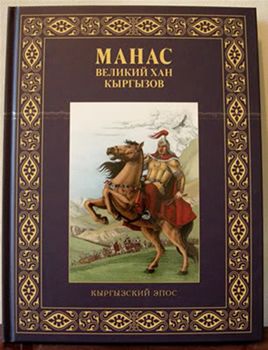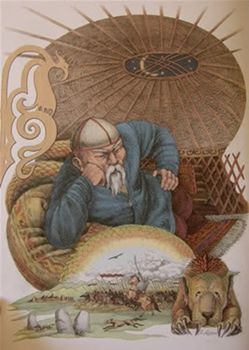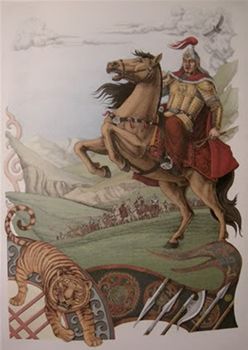
Prologue

It was a dark night. The village, sheltered at the bend in the river, was
immersed in serene dreams. Only Jakyp didn’t sleep. He lay in the dark yurt
listening to the monotonous roar of water running over stones. To the old man
it seemed as though the sound was speech, shouting and horses whinnying,
although he knew that this was but a trick of his imagination. His mind
wandered, and he thought about his son; such thoughts often deprived him of
sleep.
Already three years had passed since his first-born, Manas, had left his
birthplace. A feeling of pride seized Jakyp – he remembered that day when the
people chose Manas, who was but a boy of 16 at the time, as their Khan!
In the Kyrgyz land, the great Manas established a peaceful life, but the
happiness of Jakyp was darkened by an eternal feeling of anxiety and fear. The
Kyrgyz had insulted the great Khan of China, Esen, with the crushing defeat of
his best commanders Nezkan and Nuker and the capture of Chinese caravans.
Two years earlier, the Chinese had sent a 100,000 man army against the Kyrgyz.
The poor old man knew that the hour of retribution had begun. But his bold son,
Manas, gathered 26,000 young men from friendly Kyrgyz tribes, and defeated the
Chinese terribly. The disarrayed Chinese were ambushed in a deep ravine. His
enemies, finding themselves surrounded on all sides, became mad with despair.
With their own hands they deprived themselves of life, some by the dagger, some
by poison.
Jakyp, with 100 men, had returned to another flank, but alarming thoughts
hadn’t left him. After the victory of his son, Manas couldn’t stay in one
place. All his people repeated again and again that he needed to go on a
campaign against the near cities of the Chinese and their cities in Eastern
Turkestan! Dangu, Yarkend, Kucher, Kashgar, Turfan… and the biggest of all,
Dagalak. Dagalak was the home of Esen Kyrmus. His strength was large, and he
called himself Khan Esen. Should Manas cease his campaign? Чем больше его
уговариваешь, тем straight away he took the position: “It is nothing to wait
for death and tremble with fear. It is better not to abandon the campaign. It
is better to go there ourselves while he is not expecting us,” the Kyrgyz
persuaded the young Khan.
All the people then gathered for the campaign, but Manas prohibited the elderly
and the youth from joining the fight, saying, “Who else will watch our cattle?
Who else will protect our mothers? Who else will raise our children?”
Manas left with his army on the campaign, and around all Turkestan flew wild
rumors of a great and miraculous Kyrgyz victory over one of the Chinese rulers.
Only Jakyp wasn’t pleased by this news. “Ох, не к дорбу все это! The strongest
Emperor of China? It is forbidden to pull his mustache without punishment –
even the feeblest of dogs.”
Suddenly Jakyp caught, through the monotonous sound of the river, some kind of
new sound. The old man raised himself a little and listened. This wasn’t a
dream: he heard the distinct sound of the drumming of hooves. Someone was
racing through the village at a driving gallop.

The tired racer brought Jakyp good news: his son was returning from his
campaign, and was bringing with him a young wife!
The sun had yet to rise, but the Kyrgyz people had already begun to prepare for
the long awaited reunion. Some stripped the carcasses of deer, while others
tended the fires under enormous cauldrons. Across from Jakyp’s yurt, they set
up a giant celebratory yurt. It was covered in snow-white felt decorated in flowers,
ribbons and artistically twined tassels.
At noon, upon hearing the enthusiastic exclamations of the people, Jakyp left
the yurt, closing it off from sunlight with palm-fronds, and saw on the high
pass riders with banners. The people around him were frozen with surprise. Out
from the line appeared many new and happy warriors. Already, all space around
them was filled with riders, and they flew down like an avalanche which seemed
to have no end.
Suddenly, Jakyp heard a happy cry, “Manas! My son!” – it was old Chyiyrdi, who
threw herself forward to meet the arrival of the young commander who escorted
the group of riders. His armor and weapons, tipped with gold and silver,
distinguished him among the other warriors.
Jakyp peered at his son, who leapt from his horse and rushed to his mother.
Three years ago, the old man had sent a young teen off on a campaign; he had
returned a mature man. From behind Jakyp, his brothers Abyke and Kyobyosh
watched anxiously.
“Father, I return in victory!” said Manas, approaching Jakyp and bowing his
head as a sign of respect. Moved, the father drew his son to him.
“I heard of your battles; steppe rumors brought me news of you. But I want to
know everything from your mouth. How I dreamt of seeing you again, Manas! And how
I feared your loss! But first and foremost, where is your bride?”
Manas returned to his company of riders. He sprightly leapt to the back of one
warrior’s stallion and removed the rider’s helmet. Onto the warrior’s shoulders
fell waves of silky hair. It was a girl!
Beautifully, she turned. She had a finely boned face. Her brows curved as if
stretched over a bow. Her round eyes were knowing and radiant, peaked with long
eyelashes. Her neck was proud and swan-like. Manas took the girl by her hand
and brought her to his parents.
“This is Karabyork, daughter of Kaiyp Khan, ruler of the city of Danguu, which
lies on the shore of the faraway lake, Lob-Nor. Kaiyp Khan is also here with
his men. Now he is my ally, but not long ago, he and I fought. Oh, it was a
terrible battle – the waters of Lob-Nor were painted crimson. Many warriors
fell, both his and ours. Kaiyp fought like a lion. Not only his sons, but his
daughters battled against us. Karabyork was wounded by the bow of Bakai, son of
Bai. Nonetheless, she tried to stab me with her dagger, but could not withstand
my strength. Kaiyp Khan was forced to surrender to me. But for all that,
Karabyork conquered me. I couldn’t stand firm in front of her beauty. So I
returned to the land of Kaiyp Khan and became his son-in-law.”
Manas gave an order for his company of warriors to mark out a campsite, and
they carried themselves off to different ends of the enormous army in search of
the commanders. Soon the forces’ tents and yurts were erected, separated by
campfires. Jakyp, accustomed to living the peaceful life of a nomad, looked
with fear upon the enormous quantity of warriors assembled.
“Father, under me serve more than 60,000 young men,” said Manas. Noticing the
dismay of his father he added, “It is easy for me to manage them. Urbyu,
Kyokchyo, Jamgyrchi – they all remain leaders of their own detachments and
tribes, and they are excellent warriors and chiefs. The entire army works
together as one village. Managing them is as easy as raising my hands. Besides,
I have with me another worthy leader of warriors, my brother, the wise Bakai. I
entrust him with much.”
“Where is my dear nephew? Where is his father?” asked Jakyp agitatedly,
glancing from side to side in hope of seeing his brother Bai.
“Father, your brother died in Kashgar more than a year ago,” answered Manas
with a sad voice. “He was with me when we were protecting the country of Eset
and when we captured the city of Mangyt. Together we freed the Kalmyks from
captivity: our brother Orozdu with his ten sons and the sons of Bai, Bakai and
Tailak. My uncle died a happy man; he was free and campaigning with his sons
like a true warrior.”
At that moment two new warriors entered the yurt. The first of them reminded
Jakyp of his elder brother Bai as a youth, only the shoulders of this youth
were broader. In his eyes shone natural wisdom and majesty. “Bakai!” surmised
Jakyp, who then shifted his gaze to the other rider. Although his face was
lined with deep wrinkles and his hair and beard were as white as snow, Jakyp
immediately recognized someone dear to his heart. “Orozdu!” cried the old man,
and hurried to his brother. Jakyp rushed through the rest of his greetings of
the ten indefatigable sons of Orozdu. They jostled before him, each not wishing
to give up first place to any of the others.
Not turning attention on гвалат which was raised up (by?) the youths, Jakyp and
Orozdu talked without ceasing. Much time had passed while the brothers were
separated. They needed to ask each other about everything. Although Jakyp was
also impatient to hear the tales of Manas, but he merely held his hands.
“First a wedding той! My father-in-law Kaiyp and his people are all here. And
my warriors are tired from battle. Let music play and let the girls sing songs!
We have dreamt so long of returning home!” cried Manas.
The sounds of lutes began to ring, and the strumming the komuz (a traditional
Kyrgyz stringed instrument) poured over them, sharing the lengthy songs of the
nomads. Manas and Karabyork stood side by side; in their hands they held a twig
on either end. Jakyp approached them and broke the twig in half, such that each
of the youths retained an equal half. The young couple then flung the twigs
from themselves. Like in дверности they were now joined together inviolate as
any treaty.
“Now you are husband and wife!” solemnly proclaimed Jakyp, who was then
overwhelmed by the mountainous echo of thousands of voices chanting “Manas!
Karabyork!”
Chyiyrdi anointed Karabyork’s forehead with pieces of сала, then threw them in
the hearth. This was a sacrifice to the souls of the ancestors of Manas. In
this moment, they took the young woman under their protection.

No comments:
Post a Comment